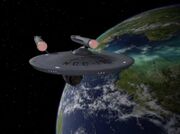Agreed. While the argument can be made and supported that the divergence point was prior to the Narada's misadventure, I think we all know what TPTB's intentions were.
Though I suppose an argument can also be made that this wouldn't be the first time the novels would go in a direction contrary to those intentions..
Nimoy's character was the Spock we grew up with. Anything else is denial or deliberate misinterpretation.
It's that simple.
Quite to the contrary, it's simply logic--or, if you want to be vain-glorious about it, anti-propaganda. The filmmakers claim the movie does something which the movie does not, either intentionally or by mistake--neither would be surprising, given the crap they've tried to pass off as 'writing'.
Nimoy's character could be any Spock from any timeline--at no point does he do, say or otherwise interact with the universe in a fashion that would indicate that he's 'our' Spock as opposed to, say, that universe's Spock. All we have is appearance and age, which tells us nothing except this future is one which Spock lived to that age, and never modified his appearance with a rakish eyepatch or some badass piercings, for instance.
The rest of the 24th century elements actually suggest the obverse of the supposed scenario: Spock's ship, Nero's ship, Nero's (sub?)cultural practices, so-called 'red matter', the laws of physics are different in that supernova travel at light-speed, the odd scenario of a lone ambassador flying the ship supposed to save Romulus. The temporal mechanics of the scenario the film presents don't work at all (if Nero creates a divergeant timeline by his arrival in the past, how does Spock wind up there?), and the scenes aboard the Kelvin suggest that this reality was always already slightly askew to our received history.
None of this is conclusive. With sufficient skill at sophistry, and the odd desire to deploy it on behalf of a sad excuse of a Trek film like Abrams' Product, a lot of the above can be rationalized away. The ships and the red matter represent innovations in the intervening years (or perhaps even earlier, since Nemesis was too busy playing Mad Max with Sand People to provide a full account of contemporary design and research); ditto the political situation on Romulus. Or, since we never saw much of the Romulans beyond the fleet, Nero represents a unique cultural segment of society never shown onscreen before now. Not sure what you would do with the messed-up physics and the Kelvin--ignore it, I guess.
The question is, why bother? What's worth ignoring the obvious solution to the above--it was always an alternate universe--and instead jumping through all these hoops and creating empty rationalizations in order to cloak the filmmakers' errors? Abrams' Product adds nothing to the mythos, at least as far as any 'Primeverse' is concerned. It is, in fact, substractive, as we get Yet Another Fucking Genocide casually tossed off, and lose Spock and the Romulan Empire.
And intent? Piffle. I doubt anybody who wrote "These Are The Voyages..." intended it to be the historical cover-up of a mind-boggling conspiracy. But they left, and the books were free to disregard what they thought. At the pace the books are coming out and advacing in the timeline, I rather expect that by the time they reach the point we they might have to engage with Abrams' Product, the studios will have moved on to the re-reboot and a different set of folk (who hopefully won't suck as badly, but probably not) will be in charge anyway.
Ficititiously yours, Trent Roman


 I guess thats why they pay you the big bucks.
I guess thats why they pay you the big bucks. 



